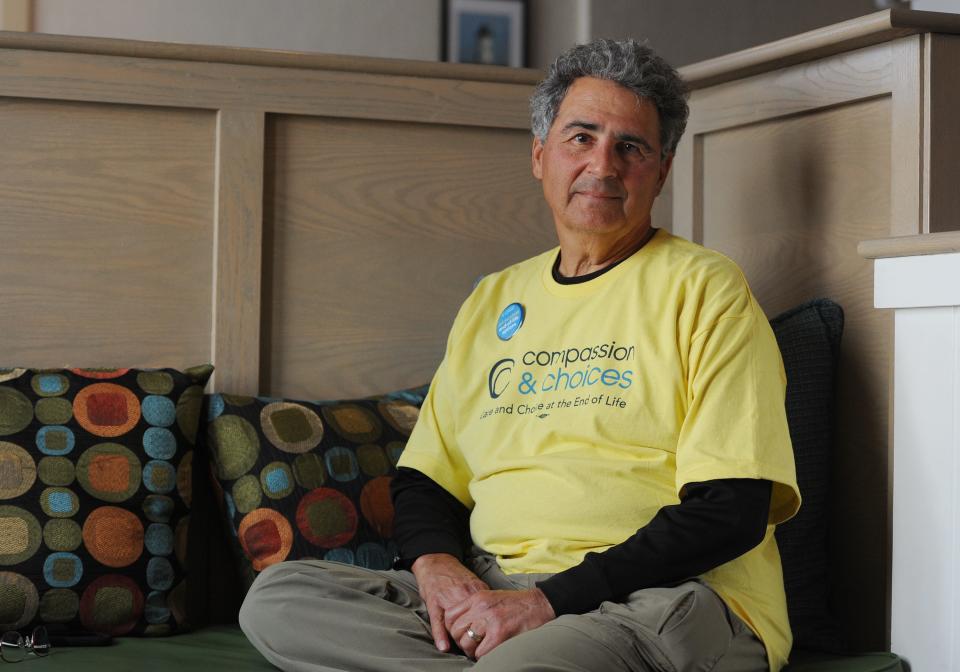Medical-aid-in-dying bill clears one legislative hurdle; retired Cape doctor is advocate
A medical-aid-in-dying bill, championed by among others, a retired Cape Cod physician, is an essential piece of legislation that is about “humanity” and “choice,” advocates argue.
The End of Life Options Act has cleared one legislative hurdle and now awaits action in the Legislature by the Senate Ways and Means Committee. Lawmakers have until the end of the session on July 31 to act but the proposal has repeatedly failed to win approval.
That needs to change, according to one of the sponsors.
“I think it is imperative that we find a way to pass this piece of legislation,” said state Rep. James O’Day, D-Worcester, in a virtual panel discussion hosted by End of Life Options MA Coalition, last month.
O’Day, an early sponsor of the bill, said he believes the legislation will make an incredible difference in the lives of many people and “has so many different guidelines associated with it .... there are no options where this could be viewed as taking advantage of anybody.”
Dr. Roger Kligler, a one-man-resource for the Cape
Cape Cod doesn’t have any exclusive resources in terms of medical aid in dying, but has one unique voice.

“The Cape is an older demographic, and older people tend to think about their mortality a little bit more,” said Dr. Roger Kligler, a retired Cape physician who leads the Cape Cod Action Team of Compassion & Choices.
Kligler has been a strong advocate of the bill, and has been helping the people of Cape Cod, with counsel and advice to explore options to “help them to have a better death.”
What is the medical aid in dying bill?
The End of Life Options Act is a piece of legislation that will allow terminally ill and mentally capable adult patients, who have six months or less to live, to request medication to die peacefully. The request cannot be accepted unless the mental capacity of the patient is certified by a licensed mental health specialist, and the request must be expressed by the patient in oral and written form, with at least a 15-day waiting period between the two.
Resources available to the public seeking medical aid in dying
Compassion & Choices, a Colorado-based nonprofit, provides several options and resources to people who want to chart their end-of-life journey. The organization also has regional support for Massachusetts, where advocates of medical aid in dying, provide necessary guidance and resources to anybody who is seeking help.
“For Massachusetts, there is a wide variety of documents that help you do advanced care planning, and outline a treatment plan,” said Melissa Stacy, the regional advocacy manager for Compassion & Choices Action Network.
Stacy said the best way to tap into those resources is through the organization’s website. “There is a significant amount of resources on there for advanced care planning.”
There is also an end-of-life consultation line, where people can talk to somebody to help them walk through the available resources on the website, she added.
Challenges from the opposing side
Any conversation on the topic has its own set of challenges. The biggest, according to Stacy, is that many view this option as being against their “ethical and religious code.” In 2023, Beacon Research conducted a poll on medical aid in dying, and about 75% of the voters supported the idea.
That would represent a change since a 2012 ballot question lost by a 52-48% margin.
Four years later, Kligler sued the state of Massachusetts to implement medical aid in dying.
“When I sued the commonwealth saying that I felt that we had a constitutional right for medical aid in dying, there were a number of disability groups that wrote amicus briefs opposing this,” said Kligler.
A glimmer of hope among advocates of the bill
Medical aid in dying is currently legal in 11 jurisdictions in the country, including Maine and Vermont in New England. “The Massachusetts bill, if passed, would be the strictest bill from a safeguards perspective in the country,” said Stacy.
Even though Massachusetts does not offer legal medical aid in dying, people can leave the state and go to either Vermont or Oregon, the two states that don't have residency requirements to get access to the option, according to Kligler.
“The people in this state have been working on this and waiting for this since 2008,” said Stacy, reiterating that the bill has significant support, both within the state and from constituents.
“Death is not easy, and this gives people an option,” said Kligler, adding that he would like for people to have an option because “it’s the humane thing.”
Thanks to our subscribers, who help make this coverage possible. If you are not a subscriber, please consider supporting quality local journalism with a Cape Cod Times subscription. Here are our subscription plans.
This article originally appeared on Cape Cod Times: Uphill battle on Beacon Hill for medical-aid-in-dying bill

